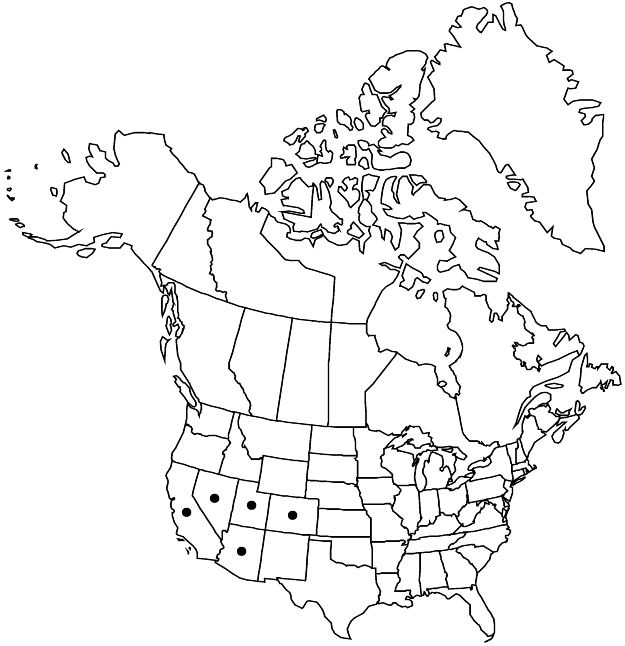Mentzelia pterosperma
Proc. Calif. Acad. Sci., ser. 2, 6: 290. 1896.
Plants winter-annual or biennial, candelabra-form. Stems solitary, erect, straight; branches distal, distal longest, antrorse, straight, hairy. Leaves: blade 13.8–78 × 3.8–20 mm, widest intersinus distance 2.5–15.8 mm; proximal oblanceolate to elliptic, margins entire or serrate to pinnate, teeth or lobes (0–) 8–14 (–22), slightly antrorse, 0.3–5.3 mm; distal elliptic to lanceolate, base usually clasping, rarely a few not clasping, margins usually serrate to pinnate, occasionally entire, teeth or lobes (0–) 6–18, slightly antrorse, 2.8–4.3 (–6.1) mm; abaxial surface with simple grappling-hook, occasionally complex grappling-hook, and rarely needlelike trichomes, adaxial surface occasionally with simple grappling-hook and needlelike trichomes. Bracts: margins usually entire, rarely pinnate. Flowers: petals golden yellow, 6.4–17 (–20) × 2–5.3 mm, apex usually acute, occasionally rounded, glabrous abaxially; stamens golden yellow, 5 outermost petaloid, filaments linear to oblanceolate, slightly clawed, 6.2–14.2 (–17.5) × 1–3.9 mm, usually without, rarely with, anthers, second whorl with anthers; anthers straight after dehiscence, epidermis smooth; styles 6–11 mm. Capsules cupshaped, 7.3–13.7 × 5.5–9.8 mm, base rounded, not longitudinally ridged. Seeds: coat anticlinal cell-walls straight, papillae 5–18 per cell. 2n = 22.
Phenology: Flowering Apr–Jun(–Jul).
Habitat: Disturbed soils, washes, sand dunes, roadcuts, badland knolls, clayey soils, gravelly soils with sandy or gypsum-rich clay.
Elevation: 300–1900 m.
Distribution

Ariz., Calif., Colo., Nev., Utah.
Discussion
Mentzelia pterosperma occurs in the Colorado Plateau and Mojave Desert. Mojave Desert populations occur from eastern San Bernardino and southeastern Inyo counties, California, through Clark County, Nevada. Colorado Plateau populations are common in northern Arizona and extend northward to Utah and western Colorado. Populations in Utah occur in habitats composed of gravelly soils that are sandy or gypsum-rich clay, whereas Arizona and Nevada populations occur primarily on clayey soils, which sometimes contain gypsum.
Selected References
None.
Lower Taxa
No values specified."not elongating" is not a number.